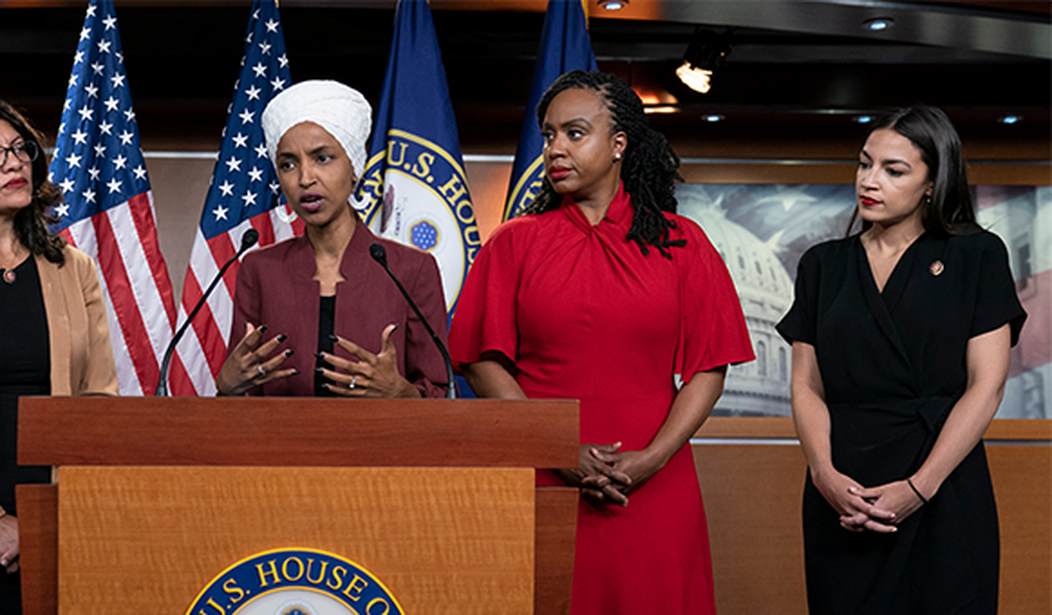The air is thick with lamentations that our two political parties are tearing themselves -- and the nation -- to pieces. The Republican president has picked a Twitter fight with four Democratic freshman congresswomen, and the Democratic speaker has chosen to violate House rules to pick a fight with the president.
Donald Trump's conduct has been treated as unprecedented by Democrats and legacy media, as has Nancy Pelosi's by Republicans and Trump supporters. That's true in a trivial sense. Twitter didn't exist before 2006; only seven current House members, not including Pelosi, were serving the last time a House speaker (Tip O'Neill) was called out (by Newt Gingrich) for violating House rules, in May 1984.
Actually, there's precedent aplenty. Both parties are behaving in line with their historic character, apparent since they were founded amidst swirling political controversies -- the Democrats in 1828, the Republicans in 1854.
The Republican Party was formed to oppose the Kansas-Nebraska Act that allowed slavery in the territories. It immediately attracted a core constituency tilted toward New England Yankees and their descendants across the Midwest. Ever since it has been centered on one core constituency of people who are regarded by themselves and others as typical Americans but by themselves are not a majority of the nation.
The Democratic Party was formed to oppose the Second Bank of the United States and support Andrew Jackson, who won his second term with big majorities from southwestern frontiersmen and workers in burgeoning cities in New York and Pennsylvania. Ever since, it has been a coalition of divergent constituencies, capable of winning robust national majorities in favorable times but being fractiously fissiparous in others.
Recommended
Today the parties are behaving according to form. Voters identifying as Republicans express almost unanimous support of a president who won less than half the votes cast in 2016 primaries. That's better than Ronald Reagan or the George Bushes typically did. This despite the fact Trump decries the war in Iraq and has broken sharply from those Republican presidents' trade and immigration policies.
On the surface, Democrats may seem united, too. House Democrats voted unanimously to violate House rules and pass a resolution denouncing Trump for a "racist" tweet. But however genuine their rage, this was obviously a diversionary tactic to cover up loud dissension in the ranks. In response to Pelosi's dismissal of "the Squad" -- the four first-term Reps. Alexandria Ocasio-Cortez, Ilhan Omar, Ayanna Pressley, and Rashida Tlaib -- as just four votes, their defenders have taken to calling Pelosi a "racist."
These incessant allegations of racism should strike Americans as absurd. There is less racism than at any time in the history of this nation that twice cast majorities of its votes for an African American president. Trump's tweet was, as Fox News' Brit Hume commented, "nativist, xenophobic, counterfactual and politically stupid." But it doesn't "meet the standard definition of racist, a word so recklessly flung around these days that its actual meaning is being lost."
It's long been lost for many reporters, who delight in headlining the latest Squad antics. Pelosi obviously fears that this isn't helpful if Democrats want to retain the House seats that gave them their majority -- upscale districts whose white college-graduate voters are repelled by Trump but aren't eager for AOC's "Green New Deal," with its proposal to make airline travel obsolete, or the 70 percent tax rate Bernie Sanders has praised.
Nevertheless, Democratic presidential candidates seem to disagree with Pelosi's analysis. They have embraced, to the dismay of The New York Times' Thomas Friedman, the abolition of private health insurance, free health care for illegal immigrants and decriminalization of illegal border crossing.
In addition, they're promising free college, forgiveness of college debt, ninth-month abortions and, as Julian Castro reminded anyone who was wondering, abortions for "someone in the trans community, a trans female."
These candidates fear attacks from one of the many constituency groups in the Democratic coalition -- or, to put it more precisely, from their self-appointed Twitter spokespersons. Attacks from even one constituency -- blacks, Latinos, gays, lesbians, transgender folk, feminists, greens; the list goes on and on -- might torpedo their attempts to climb into the first or second-tier (or, for former Vice President Joe Biden, his attempt to keep others out of them).
For many in the media, the Squad's and the groups' issue positions sound nifty, and even their recent refusals to denounce Antifa violence seem understandable. But will they prove attractive to the suburbanites Pelosi worries about or the blue-collar ancestral Democrats uncertain about voting again for Trump? Quite likely not.

























Join the conversation as a VIP Member